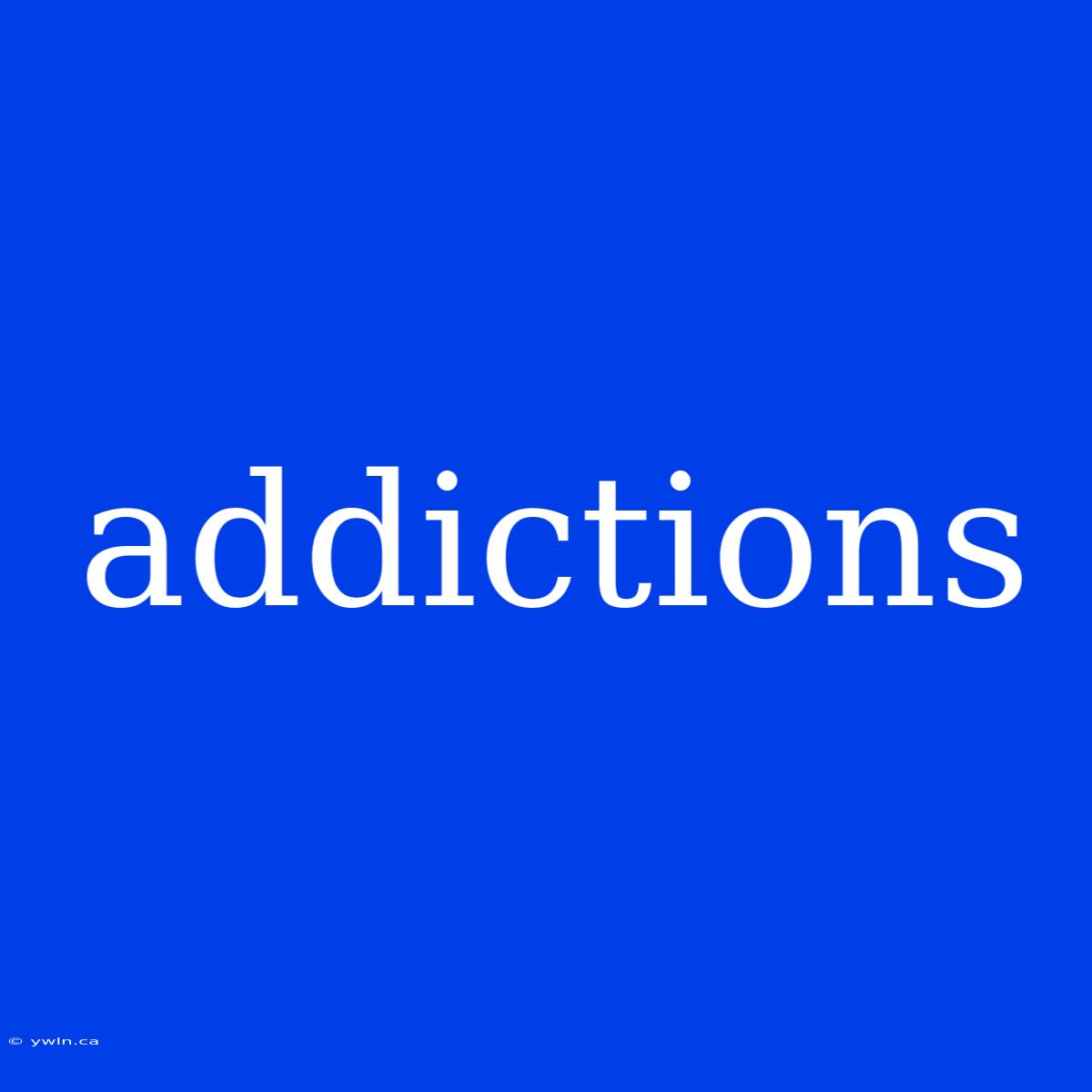Unraveling the Grip: Addiction - A Journey of Understanding and Recovery
What is addiction, and why is it so powerful? Addiction is a complex, chronic disease characterized by compulsive engagement in rewarding behaviors despite negative consequences. It is a powerful force that can take control of an individual's life, affecting their relationships, health, and overall well-being.
Editor Note: This article explores the multifaceted nature of addiction, delving into its underlying causes, impact, and potential paths to recovery. Understanding addiction is crucial to supporting individuals and fostering effective treatment and prevention strategies.
Analysis: We've meticulously analyzed research and expert insights to create a comprehensive guide to addiction, covering its different forms, the science behind its development, and the pathways to recovery. Our aim is to provide a nuanced understanding of this complex issue and offer practical insights for individuals seeking support or those wanting to learn more.
Key Aspects of Addiction:
| Key Aspect | Description |
|---|---|
| Compulsive Behavior | An overwhelming urge to engage in the addictive substance or behavior despite adverse consequences. |
| Cravings | Intense desires for the substance or activity, often leading to relapse. |
| Tolerance | The need for increasingly larger amounts of the substance to achieve the desired effect. |
| Withdrawal Symptoms | Unpleasant physical and emotional symptoms that occur when the substance is stopped or reduced. |
| Negative Consequences | Harmful effects on physical health, relationships, work, and finances. |
Addiction: A Multifaceted Challenge
Substance Use Disorders
Introduction: Substance use disorders are characterized by an inability to control the use of substances despite negative consequences.
Facets:
- Types of Substances: This includes alcohol, nicotine, opioids, stimulants, and other drugs.
- Effects: Each substance has unique effects on the brain and body, influencing the individual's experience and the potential for dependence.
- Risk Factors: Genetic predisposition, family history, trauma, and social environment can increase the risk of developing a substance use disorder.
- Treatment: Detoxification, therapy, and support groups are crucial for recovery.
Behavioral Addictions
Introduction: Behavioral addictions involve compulsive engagement in specific behaviors, such as gambling, shopping, sex, or video games, despite negative consequences.
Facets:
- Brain Mechanisms: Similar brain pathways are activated in both substance and behavioral addictions, highlighting the shared biological basis.
- Triggers: Stress, boredom, and emotional distress can trigger compulsive behavior.
- Consequences: Financial ruin, relationship breakdown, and legal problems are common outcomes.
- Treatment: Cognitive-behavioral therapy, mindfulness practices, and support groups are effective interventions.
The Cycle of Addiction:
Introduction: Understanding the cycle of addiction is essential for effective treatment and prevention.
Further Analysis:
- Trigger: An external stimulus or internal thought can initiate cravings.
- Craving: Intense desire for the substance or behavior, leading to a loss of control.
- Engagement: The individual engages in the addictive activity, seeking a temporary sense of relief or pleasure.
- Consequences: Negative consequences arise, impacting physical, emotional, or social well-being.
- Guilt and Shame: Feelings of regret and self-blame can intensify the cycle.
- Repetition: The cycle repeats, often with increasing intensity and severity.
Breaking the Cycle:
Introduction: Recovery from addiction is possible and involves addressing various aspects of the individual's life.
Key Insights:
- Professional Help: Seeking guidance from therapists, counselors, or addiction specialists is crucial.
- Therapy: Cognitive-behavioral therapy, motivational interviewing, and group therapy can help identify triggers, develop coping mechanisms, and manage cravings.
- Support Systems: Building a network of support through family, friends, or support groups is essential for staying on track.
- Lifestyle Changes: Addressing underlying issues like stress, anxiety, and depression is critical for long-term recovery.
- Medication: In some cases, medication can be helpful in managing withdrawal symptoms and cravings.
FAQ
Introduction: Common questions about addiction and recovery.
Questions:
- What causes addiction? A combination of genetic, environmental, and social factors contribute to the development of addiction.
- Can anyone become addicted? While some individuals are more susceptible due to genetic factors or past experiences, anyone can develop an addiction.
- How can I tell if someone is addicted? Signs of addiction include changes in behavior, neglect of responsibilities, and withdrawal symptoms when the substance or behavior is stopped.
- What is the best treatment for addiction? The most effective treatment for addiction involves a combination of therapy, medication, and support.
- Is addiction a disease? Yes, addiction is now recognized as a chronic disease by the American Medical Association.
- Can people recover from addiction? Yes, recovery from addiction is possible with the right support and treatment.
Summary: Addiction is a complex and challenging condition, but recovery is possible with the right support and treatment. Understanding the nature of addiction, its causes, and the pathways to recovery empowers individuals, families, and communities to support those struggling with addiction.
Closing Message: By increasing awareness and promoting evidence-based treatment, we can create a society that provides compassionate support and fosters hope for those seeking recovery from addiction.

